
The MOS Technology 6502 is an 8-bit microprocessor that was designed by a small team led by Chuck Peddle for MOS Technology. The design team had formerly worked at Motorola on the Motorola 6800 project; the 6502 is essentially a simplified, less expensive and faster version of that design.
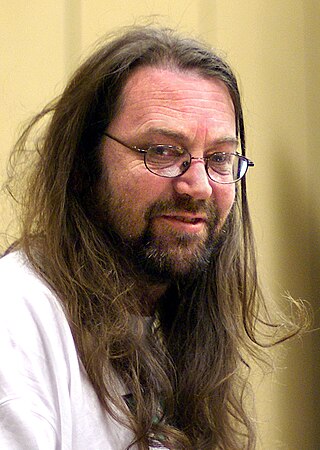
Jeff Minter is an English video game designer and programmer who often goes by the name Yak. He is the founder of software house Llamasoft and has created dozens of games during his career, which began in 1981 with games for the ZX80. Minter's games are shoot 'em ups which contain titular or in-game references demonstrating his fondness of ruminants. Many of his programs also feature something of a psychedelic element, as in some of the earliest "light synthesizer" programs including Trip-a-Tron.

The Atari 8-bit computers, formally launched as the Atari Home Computer System, are a series of home computers introduced by Atari, Inc., in 1979 with the Atari 400 and Atari 800. The architecture is designed around the 8-bit MOS Technology 6502 CPU and three custom coprocessors which provide support for sprites, smooth multidirectional scrolling, four channels of audio, and other features. The graphics and sound are more advanced than most of its contemporaries, and video games are a key part of the software library. The 1980 first-person space combat simulator Star Raiders is considered the platform's killer app.
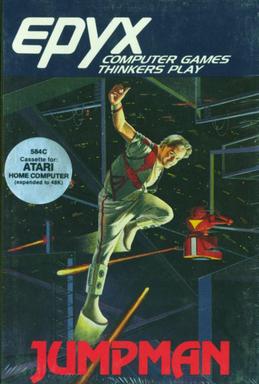
Jumpman is a platform game written by Randy Glover and published by Epyx in 1983. It was developed for the Atari 8-bit computers, and versions were also released for the Commodore 64, Apple II, and IBM PC compatibles.
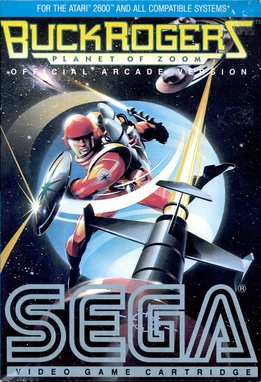
Buck Rogers: Planet of Zoom, known as Zoom 909 in Japan, is a pseudo-3D rail shooter released as an arcade video game by Sega in 1982. The player controls a spaceship in a third-person perspective, adapting the three-dimensional perspective of Sega's earlier racing game Turbo (1981) for the space shoot 'em up genre. It uses the Buck Rogers license, referencing the space battles, though Buck himself is never seen.

Shamus is a shooter with light action-adventure game elements written by Cathryn Mataga and published by Synapse Software. The original Atari 8-bit computer version was released on disk and tape in 1982. According to Synapse co-founder Ihor Wolosenko, Shamus made the company famous by giving it a reputation for quality. "Funeral March of a Marionette", the theme song from Alfred Hitchcock Presents, plays on the title screen.
Sirius Software was a California-based publisher of video games for the Apple II, Atari 8-bit computers, Commodore 64, and VIC-20. Most games were written for the Apple II, then ported to other systems. The company was founded in 1980 by Jerry Jewell and Terry Bradley and released over 160 games before folding in 1984. Sirius also developed games for the Atari 2600 which were published in 1982 and 1983 by 20th Century Fox Video Games. Fox's failure to pay Sirius resulted in company's downfall. Nasir Gebelli wrote some of the early hits from Sirius, establishing his reputation as an Apple II game programmer.
Synapse Software Corporation was an American software developer and publisher founded in 1981 by Ihor Wolosenko and Ken Grant. Synapse published application software and developer tools, but was primarily known for video games. It initially focused on the Atari 8-bit computers, then later developed for the Commodore 64 and other systems. Synapse was purchased by Broderbund in late 1984 and the Synapse label retired in 1985.

Anteater is an arcade video game designed by Chris Oberth and released in 1982 by Tago Electronics. The player steers the tongue of the eponymous creature through a maze, retracting it when dangers approach. Though the arcade game was not a hit, it spawned a number of direct clones for home computers; Sierra's Oils Well became better known than the original. Oberth wrote an Apple II version of his own game for Datamost using a different title.

Mr. Robot and His Robot Factory is a platform game created for Atari 8-bit computers by Ron Rosen and published in 1983 by Datamost. The music was composed by Gary Gilbertson using Philip Price's Advanced Music Processor, while the title screen was drawn by Art Huff. It was ported to the Apple II by Robert McNally and to the Commodore 64.
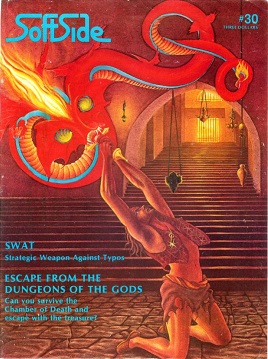
SoftSide is a defunct computer magazine, begun in October 1978 by Roger Robitaille and published by SoftSide Publications of Milford, New Hampshire.

Moondust is a 1983 generative music video game created for the Commodore 64 by virtual reality pioneer, Jaron Lanier. Moondust was programmed in 6502 assembly in 1982, and is considered the first art video game. Moondust has frequently been used as an art installation piece in museum exhibitions from Corcoran Gallery of Art's 1983 "ARTcade" to the Smithsonian's 2012 "The Art of Video Games". It has also been used by Lanier and others in papers and lectures as an example to demonstrate the unexpected ephemerality of digital data.
The English Software Company, later shortened to English Software, was a Manchester, UK-based video game developer and publisher that operated from 1982 until 1987. Starting with its first release, the horizontally scrolling shooter Airstrike, English Software focused on Atari 8-bit computers of home, then expanded to other platforms. The company used the slogan "The power of excitement".

Fred D'Ignazio is an American author, educator, and television commentator. He was born in Bryn Mawr, Pennsylvania and is considered to be one of the world's leading pioneers in multimedia-based education. From 1972 to 1976, he was an assistant editor for The Futurist magazine published by the World Future Society. In the 1980s and 1990s he was an associate editor and columnist for COMPUTE! and COMPUTE!'s Gazette and a technology commentator on ABC's Good Morning America. He is also the author of over 20 non-fiction books on science and technology, as well as a series of juvenile science fiction novels.

Cohen's Towers is a platform game written by Frank Cohen and released by Datamost in 1983 for Atari 8-bit computers and Commodore 64. It was re-released in 1986 by Databyte in the United Kingdom.
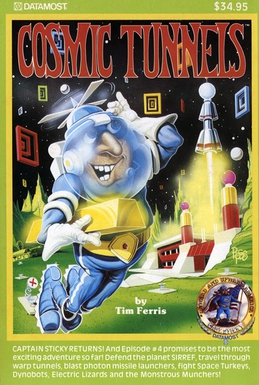
Cosmic Tunnels is a space-themed action game written by Tim Ferris and published by Datamost in 1983 for Atari 8-bit computers and in 1984 for the Commodore 64. Datamost also sold the game with Cohen's Towers as a "twin pack". It was re-released in 1986 by Databyte in the United Kingdom.

Monster Smash is an action game written by Dave Eisler and published by Datamost in 1983 for the Apple II and Atari 8-bit computers. A Commodore 64 port followed in 1984. The music in the Atari 8-bit version was written by Gary Gilbertson and praised by reviewers. An earlier version of the game was published by The Software Farm in 1982 as Monster Mash.
Hal Glicksman is an American curator of contemporary art, educator, and writer.















